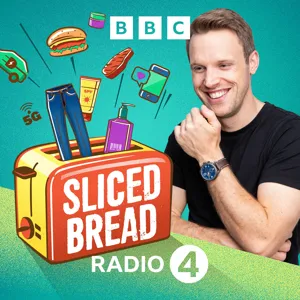Podcast Summary
Chef's preferred cookware for different tasks: Cast iron for searing, stainless steel for boiling and vegetables, anodized titanium for lightweight and versatility. Understand cookware materials for successful home cooking.
When it comes to choosing cookware, there are various options available, each with its unique benefits. Tim Hayward, a chef and author, shared his preferences during a visit to his home. He uses a cast iron pan for searing meat, a deep stainless steel pot for cooking vegetables and boiling water, and an anodized titanium pan for its lightweight and versatility. Each material has its advantages, and the choice depends on individual cooking needs and preferences. Additionally, there are various additional tools like hotspots and non-stick coatings that can enhance the cooking experience. Overall, understanding the properties and uses of different cookware materials can lead to successful and enjoyable home cooking.
Manufacturing Non-Stick Pans: Heating and Cooling PTFE Layers: Non-stick pans, particularly those with PTFE coating, offer convenience in cooking but their safety remains a concern due to potential health effects of PTFE production and use.
Non-stick pans, particularly those with a PTFE or Teflon coating, are made through a process of heating and cooling multiple layers of polytetrafluoroethylene (PTFE), a perfluoropolymer. These pans are known for their non-stick properties due to their hydrophobic and oil-repellent nature. However, concerns have arisen regarding the safety of these coatings, with some pointing to incidents like the West Virginia Teflon factory case where the release of perfluorooctanoic acid (PFOA) led to health issues. It's important to note that while the use of PFAS, including PFOA and PTFE, has been phased out in many countries, their potential health effects are still a topic of ongoing research. So, in essence, non-stick pans offer convenience in cooking, but their safety remains a concern.
Health Concerns with PFOA in Non-Stick Coatings Lead to Ban: PFOA, a chemical used in non-stick coatings, was banned due to health issues. PTFE, the replacement, can release harmful fumes and scratching can create microplastics, but consensus is they pass through harmlessly.
PFOA, a chemical used in the production of Teflon non-stick coatings until the late 2000s, has been linked to various health issues such as infertility, different types of cancers, thyroid problems, and liver diseases. Due to these concerns, the use of PFOA was banned in the UK in 2005, Europe in 2008, the US in 2014, and internationally in 2019. Now, manufacturers use PTFE to make non-stick coatings, but they no longer use PFOA in its production. PTFE itself is generally considered safe, but under certain conditions, such as superheating, it can release harmful fumes known as polymer fume fever. The temperature at which PTFE starts to break down is around 260 degrees Celsius. It's recommended not to leave your pan heating with nothing in it for long periods of time. Scratching the non-stick coating with metal utensils can result in microplastics forming, but the consensus is that they will pass through the body harmlessly. Some non-stick coatings claim to be PFAS-free, such as the Always Pan with a ceramic non-stick coating, which is made using the sol-gel method. Overall, while the health concerns surrounding PFOA have led to its ban, ongoing research is being conducted on the potential health effects of PTFE and other non-stick coatings.
Choosing the Right Coating for Pots and Pans: Consider the type of cooking and specific coating material when choosing between anodized aluminum, ceramic, and Teflon coatings for pots and pans. Anodized aluminum is stable but less nonstick, ceramic is hard and less prone to chipping, while Teflon is the most nonstick but has potential environmental concerns.
The choice between nonstick coatings for pots and pans depends on the type of cooking and the specific coating material. Anodized aluminum and ceramic coatings have their advantages and disadvantages. Anodized aluminum is chemically stable and less likely to leach aluminum into food, but it's not as nonstick as Teflon. Ceramic coatings are harder and less prone to chipping, but they can become rough and sticky if chipped. Teflon is the most nonstick material but is more easily chipped and has potential environmental concerns due to fluoropolymers. High temperatures can make surfaces nonstick naturally, and sometimes sticking is desired for caramelization in cooking. It's essential to consider the specific cooking requirements and the type of coating when choosing pots and pans.
Comparing cast iron and stainless steel pans for searing: Cast iron pans retain and distribute heat well for searing, but require seasoning. Stainless steel pans have a naturally non-stick surface and don't need seasoning.
Cast iron pans and stainless steel bottom pans are ideal for searing due to their ability to retain and distribute heat effectively. However, nonstick pans should be avoided for this purpose as they may not be able to handle the high heat required for searing. Cast iron pans require seasoning before use to build up a non-stick surface, but they are not truly non-stick and require special care in cleaning. Stainless steel pans, on the other hand, do not need seasoning as they have a naturally non-stick surface due to their material. The choice between the two ultimately depends on the cook's preferences, cooking style, and equipment.
Advanced Features in Modern Pots and Pans: Modern pots and pans come with features like induction-readiness, non-stick coatings, temperature indicators, and combinations of these for optimal functionality.
Modern pots and pans come with advanced features and materials that enhance their functionality. For instance, induction-ready pans have a bottom layer made of magnetic material for efficient heating. Copper pans, while aesthetically pleasing, have a stainless steel interior for non-stick properties. Enameled pans can also act as effective non-stick surfaces at high temperatures. Ceramics and Teflon non-stick coatings have their advantages, with Teflon reportedly lasting longer than ceramics in tests. Some pans may have temperature indicators, like red dots, which change color when the pan reaches a certain temperature. The most sliced bread of pans for the speaker is the modern layered pan, which combines the right surfaces for induction, non-stick properties, and aesthetics. While cast iron pans are great, their heavyweight can be a downside. Overall, understanding the different materials and their properties can help consumers make informed decisions when purchasing pots and pans.
Different types of cookware materials have unique advantages and disadvantages: Choose cookware based on personal preferences, cooking needs, and budget. Consider the unique advantages and disadvantages of materials like cast iron, stainless steel, aluminum, and composites. Ensure reputable brands for stainless steel and aluminum to prevent health concerns.
Each type of cookware material, such as cast iron, stainless steel, aluminum, and even modern composites, has its unique advantages and disadvantages. Cast iron retains heat well and is excellent for searing, but it can be heavy and requires careful seasoning. Stainless steel is easy to clean and doesn't react with food, but it takes longer to heat up. Aluminum heats up quickly and is lightweight, but it can warp or react with acidic or alkaline foods unless anodized. Modern composite materials offer the benefits of multiple metals, but they can be more expensive. Regarding health concerns, reputable brands are essential for stainless steel and aluminum to prevent metal leaching or coating issues. The new generation of PTFE-based nonstick coatings is safer than before but still raises concerns about potential toxicity at normal cooking temperatures. Ultimately, the choice of cookware depends on personal preferences, cooking needs, and budget.
Non-stick pans and PFAS: Focus on reducing overall PFAS exposure by choosing alternatives to non-stick pans, like cast iron or ceramic/anodized coatings, for efficient and easy-to-clean cooking surfaces.
While PTFE non-stick pans have raised concerns due to the use of fluoropolymers or PFAS, the concentrations of these chemicals in pans are significantly lower than those found in other everyday products. Therefore, there's no need to specifically worry about non-stick pans. Instead, focus on reducing overall exposure to PFAS by choosing alternatives like cast iron pans with seasoned coatings or pans with ceramic or anodized coatings. These alternatives offer efficient and easy-to-clean cooking surfaces without the use of non-stick coatings. When making a purchase, consider the material and coating based on the type of cooking you do. I recently bought a set of T-fal pans with a combination of anodized and stainless steel finishes, and they have turned out to be a good choice for me. Overall, it's essential to be informed about the materials and coatings we use in our kitchenware and make informed decisions based on our specific needs and preferences.
Investing in Health and Values: Regular exercise is vital for health, ethical fashion is affordable, and thoughtful gifts bring joy
While the debate on whether to invest in expensive branded exercise equipment or opt for cheaper alternatives can be a personal decision, it's essential to remember the benefits of regular physical activity for overall health and wellbeing. The crisis of inactivity in the UK is a significant concern, and making exercise a priority can lead to numerous health advantages. Meanwhile, in the realm of fashion, the key takeaway is that it's possible to enjoy high-quality, ethically-manufactured clothing without breaking the bank. Brands like Quince offer luxury essentials at affordable prices, allowing consumers to enjoy the finer things in life without compromising their values or their wallets. Additionally, the importance of celebrating life's special occasions with thoughtful gifts was highlighted in the podcast. 1800flowers.com offers a range of gifts that are made with love and care, ensuring that every occasion is marked with a smile. In conclusion, whether it's investing in exercise equipment, fashion essentials, or thoughtful gifts, it's essential to remember the value of prioritizing our health, values, and relationships.






